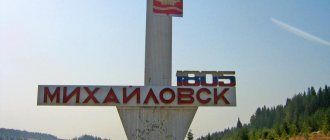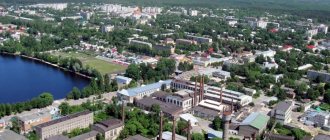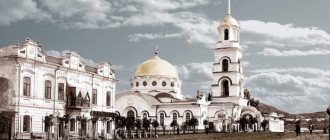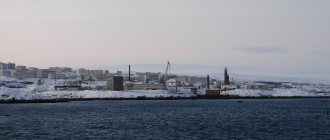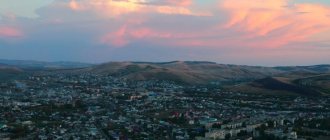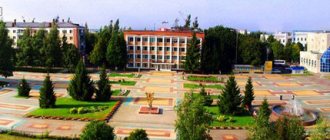City in Komi Republic, Russia
| Vuktyl Vuktyl | |
| City [1] | |
| Other transcription(s) | |
| • Komi | Vuktyl |
| View of Vuktyl | |
| Coat of arms | |
| Location of Vuktyl | |
| Vuktyl Location of Vuktyl Show map of Russia Vuktyl Vuktyl (Komi Republic) Show map of the Komi Republic | |
| Coordinates: 63°42'N 57°19'E / 63.700°N Latitude 57.317°E / 63,700; 57.317 Coordinates: 63°42'N 57°19'E. / 63.700°N 57.317°E / 63.700; 57.317 | |
| A country | Russia |
| Federal subject | Komi Republic [1] |
| Based | 1968 [2] |
| City status from | 1989 [2] |
| Population (2010 Census) [3] | |
| • General | 12 356 |
| • Evaluate (2018) [4] | 10017 ( -18,9% ) |
| Administrative status | |
| • Subordinate | city of republican significance Vuktyl [1] |
| • Capital from | city of republican significance Vuktyl [1] |
| Municipal status | |
| • Municipal district | Vuktylsky municipal district [5] |
| • Urban village | Urban settlement Vuktyl [5] |
| • Capital from | Vuktyl municipal district [5], urban settlement Vuktyl [5] |
| Timezone | UTC+3 (MSK[6]) |
| Postal code [7] | 169570 |
| OKTMO ID | 87712000001 |
| Web site | www.vuktyl.com |
Vuktyl
(Russian: Вуктил) is a city in the Komi Republic, Russia, located on the right bank of the Pechora River, near its confluence with the Vuktyl River, 575 kilometers (357 mi) northeast of Syktyvkar, the capital of the republic. Population: 12,356 (2010 census); [3] 14,472 (2002 census); [8] 19,330 (1989 census). [9]
Administrative and municipal status[edit]
Within the administrative divisions, the city of Vuktyl, together with four settlement administrative territories of rural type (including ten rural settlements), included as the city of republican significance of Vuktyl
-an administrative unit with a status equal to that of districts.
[1] As a municipal division, the city of republican significance of Vuktyl is included as Vuktyl Municipal District
;
the city of Vuktyl is included in it as the urban settlement of Vuktyl
. [5]Four administrative territories of rural settlements are included in four rural settlements within the municipal district. [5]
Climate
The climate of Vuktyl is moderate continental with long winters and short summers.
The city of Vuktyl is equated to the regions of the Far North.
- Average annual air temperature - −1.3 °C
- Relative air humidity - 77.2%
- Average wind speed - 3.1 m/s
| Average daily air temperature in Vuktyl | ||||||||||||
| Jan from −49.5 to 2.5 | Feb from −47.3 to 1.6 | Mar from −38.8 to 10.0 | Apr from −31.4 to 22.0 | May from −19.4 to 29.9 | Jun from −4.2 to 32.8 | Jul from 0.4 to 34.2 | Aug from −2.9 to 31.8 | Sep from −8.8 to 26.7 | Oct from −21.6 to 18.1 | Nov from −43.1 to 6.0 | Dec from −50.1 to 3.2 | Year from −50.1 to 2.2 |
| −17.9 °C | −15.6 °C | −7.8 °C | −2.0 °C | 5.1 °C | 12.9 °C | 16.2 °C | 12.0 °C | 6.6 °C | −0.6 °C | −10.4 °C | −15.2 °C | −1.3 °C |
Links[edit]
Notes[edit]
- ^ abcde Law No. 16-RZ
- ^ B with "General information" (in Russian). Retrieved February 24, 2022.
- ^ a b Federal State Statistics Service (2011). All-Russian Population Census 2010. Volume 1 [All-Russian Population Census 2010, vol. 1]. All-Russian Population Census 2010 [All-Russian Population Census 2010] (in Russian). Federal State Statistics Service.
- "26. The size of the permanent population of the Russian Federation by municipalities as of January 1, 2022". Federal State Statistics Service. Retrieved January 23, 2022.
- ^ abcdef Law No. 11-RZ
- "On the Calculation of Time". Official Internet portal of legal information
. June 3, 2011. Retrieved January 19, 2022. - Post office. Information and computing center of OASU RPO. ( Post office
).
Search for postal service objects ( postal Search for objects
) (in Russian) - ↑
Federal State Statistics Service of Russia (May 21, 2004). The population of the Russian Federation, cities of the Russian Federation within federal districts, urban settlements, urban settlements, settlements, settlements is 3 thousand or more people [Population of Russia, its federal districts, subjects of the Federation, districts, urban settlements, rural settlements - administrative centers and rural settlements with a population of more than 3000 people] (XLS). All-Russian Population Census of 2002 [All-Russian Population Census of 2002] (in Russian). - All-Union Population Census of 1989 Population of Union and Autonomous Republics, Autonomous Regions and Districts, Territories, Regions, Urban Settlements and Village District Centers [All-Union Population Census of 1989: Current Population of Union and Autonomous Republics, Autonomous Regions and Districts, Territories, Regions , districts, urban settlements and villages performing the functions of district administrative centers]. All-Union Population Census of 1989 [All-Union Population Census of 1989] (in Russian). Institute of Demography of the National Research University: Higher School of Economics [Institute of Demography of the National Research University: Higher School of Economics]. 1989 - via Demoscope Weekly
.
Sources [edit]
- State Council of the Komi Republic. Law No. 13-RZ of March 6, 2006 “On the administrative-territorial structure of the Komi Republic,” as amended. Law No. 171-RZ of December 26, 2014 “On the abolition of the settlement of Verkhnyaya Sedka, located on the territory of the Priluzsky district of the Komi Republic, and in connection with this amendments to some Laws of the Komi Republic.” Came into force on the date of official publication. Published: “Respublika”, No. 44, March 16, 2006 (State Council of the Komi Republic. Law of March 6, 2006 No. 16-RZ “ On the administrative-territorial structure of the Komi Republic”
as amended by Law No. 171-RZ of December 26 2014.
On the abolition of the settlement of Verkhnyaya Sedka, located on the territory of the Priluzsky district of the Komi Republic, and on introducing corresponding changes to various laws of the Komi Republic
... Effective from the date of official publication.). - State Council of the Komi Republic. Law No. 11-RZ of March 5, 2005 “On the territorial organization of local self-government in this Komi”, as amended. Law No. 171-RZ of December 26, 2014 “On the abolition of the settlement of Verkhnyaya Sedka, located on the territory of the Priluzsky district of the Komi Republic, and in connection with this amendments to some Laws of the Komi Republic.” Entered into force on April 1, 2005. Published: “Respublika”, No. 44–45, March 17, 2005 (State Council of the Komi Republic. Law of March 5, 2005 No. 11-RZ “ On the territorial organization of local self-government in the Republic Komi"
as amended by Law No. 171-RZ of December 26, 2014.
On the abolition of the settlement of Verkhnyaya Sedka, located on the territory of the Priluzsky district of the Komi Republic, and on introducing appropriate amendments to various laws of the Komi Republic
. Effective from April 1, 2005).
Excerpt characterizing Vuktyl (urban district)
Moscow, meanwhile, was empty. There were still people in it, a fiftieth of all the former inhabitants still remained in it, but it was empty. It was empty, just as a dying, exhausted hive is empty. There is no longer any life in a dehumidified hive, but at a superficial glance it seems just as alive as the others. The bees hover just as happily in the hot rays of the midday sun around the dehumed hive, as around other living hives; it also smells like honey from afar, and bees fly in and out of it. But you have to take a closer look at it to understand that there is no longer life in this hive. Bees fly differently than in living hives; the wrong smell, the wrong sound amazes the beekeeper. When a beekeeper knocks on the wall of a sick hive, instead of the previous, instant, friendly response, the hiss of tens of thousands of bees, menacingly pressing their butts and quickly beating their wings producing this airy vital sound, he is answered by scattered buzzing sounds echoing in different places of the empty hive. From the entrance there is no smell, as before, of the alcoholic, fragrant smell of honey and poison, it does not bring from there the warmth of fullness, and the smell of emptiness and rot merges with the smell of honey. At the entrance there are no more guards preparing to die for protection, raising their butts in the air, trumpeting the alarm. There is no longer that even and quiet sound, the fluttering of labor, similar to the sound of boiling, but the awkward, disjointed noise of disorder is heard. Black oblong robber bees, smeared with honey, timidly and evasively fly in and out of the hive; they do not sting, but escape from danger. Previously, they only flew in with burdens, and empty bees flew out, now they fly out with burdens. The beekeeper opens the bottom well and peers into the lower part of the hive. Instead of the previously black lashes of succulent bees, pacified by labor, holding each other’s legs and pulling the foundation with a continuous whisper of labor, sleepy, shriveled bees wander in different directions absent-mindedly along the bottom and walls of the hive. Instead of a floor cleanly sealed with glue and swept away by fans of wings, at the bottom lie crumbs of wax, bee excrement, half-dead bees, barely moving their legs, and completely dead, untidy bees. The beekeeper opens the top well and examines the head of the hive. Instead of continuous rows of bees, clinging to all the spaces of the honeycombs and warming the babies, he sees the skillful, complex work of the honeycombs, but no longer in the form of virginity in which it was before. Everything is neglected and dirty. Robbers - black bees - scurry quickly and stealthily around the work; their bees, shriveled, short, lethargic, as if old, slowly wander, not bothering anyone, not wanting anything and having lost consciousness of life. Drones, hornets, bumblebees, and butterflies knock stupidly on the walls of the hive in flight. In some places, between the wax fields with dead children and honey, angry grumbling is occasionally heard from different sides; somewhere two bees, out of old habit and memory, cleaning the nest of the hive, diligently, beyond their strength, drag away a dead bee or bumblebee, not knowing why they are doing this. In another corner, two other old bees are lazily fighting, or cleaning themselves, or feeding one another, not knowing whether they are doing it in a hostile or friendly manner. In the third place, a crowd of bees, crushing each other, attacks some victim and beats and strangles it. And the weakened or killed bee slowly, lightly, like fluff, falls from above into a pile of corpses. The beekeeper unfolds the two middle foundations to see the nest. Instead of the previous solid black circles of thousands of bees sitting back and forth and observing the highest secrets of their native work, he sees hundreds of dull, half-dead and sleeping skeletons of bees. Almost all of them died, without knowing it, sitting on the shrine that they cherished and which no longer exists. They smell of rot and death. Only some of them move, rise, sluggishly fly and sit on the enemy’s hand, unable to die, stinging him - the rest, dead, like fish scales, easily fall down. The beekeeper closes the well, marks the block with chalk and, having chosen the time, breaks it out and burns it. So empty was Moscow when Napoleon, tired, restless and frowning, walked back and forth at the Kamerkollezhsky Val, waiting for that, although external, but necessary, according to his concepts, observance of decency - a deputation. In different corners of Moscow people were still moving senselessly, keeping old habits and not understanding what they were doing. When it was announced to Napoleon with due caution that Moscow was empty, he looked angrily at the person who reported this and, turning away, continued to walk in silence. “Bring the carriage,” he said. He got into the carriage next to the adjutant on duty and drove to the suburbs. - “Moscow deserte. Quel evenemeDt invraisemblable!” [“Moscow is empty. What an incredible event!”] he said to himself. He did not go to the city, but stopped at an inn in the Dorogomilovsky suburb. Le coup de theater avait rate. [The end of the theatrical performance failed.] Russian troops passed through Moscow from two o'clock in the morning until two o'clock in the afternoon and carried away with them the last residents and wounded who were leaving. The biggest crush during the movement of troops occurred on the Kamenny, Moskvoretsky and Yauzsky bridges. While, bifurcated around the Kremlin, the troops crowded onto the Moskvoretsky and Kamenny bridges, a huge number of soldiers, taking advantage of the stop and crowded conditions, returned from the bridges and stealthily and silently snuck past St. Basil's and under the Borovitsky Gate back up the hill to Red Square, on which, by some instinct, they felt that they could easily take someone else’s property. The same crowd of people, as if for cheap goods, filled Gostiny Dvor in all its passages and passages. But there were no tenderly sugary, alluring voices of the hotel guests, there were no peddlers and a motley female crowd of buyers - there were only the uniforms and greatcoats of soldiers without guns, silently leaving with burdens and entering the ranks without burdens. Merchants and peasants (there were few of them), as if lost, walked among the soldiers, unlocked and locked their shops, and themselves and the fellows carried their goods somewhere. Drummers stood on the square near Gostiny Dvor and beat the collection. But the sound of the drum forced the robber soldiers not, as before, to run to the call, but, on the contrary, forced them to run further away from the drum. Between the soldiers, along the benches and aisles, people in gray caftans and with shaved heads could be seen. Two officers, one in a scarf over his uniform, on a thin dark gray horse, the other in an overcoat, on foot, stood at the corner of Ilyinka and talked about something. The third officer galloped up to them. “The general ordered everyone to be expelled now at any cost.” What the hell, it doesn't look like anything! Half the people fled. “Where are you going?.. Where are you going?” he shouted at three infantry soldiers who, without guns, having picked up the skirts of their greatcoats, slipped past him into the ranks. - Stop, rascals! - Yes, please collect them! - answered another officer. – You can’t collect them; we have to go quickly so that the last ones don’t leave, that’s all! - How to go? they stood there, huddled on the bridge and didn’t move. Or put a chain so that the last ones don’t run away? - Yes, go there! Get them out! - the senior officer shouted. The officer in the scarf got off his horse, called the drummer and went with him under the arches. Several soldiers began to run in a crowd. The merchant, with red pimples on his cheeks near his nose, with a calmly unshakable expression of calculation on his well-fed face, hastily and dapperly, waving his arms, approached the officer. “Your honor,” he said, “do me a favor and protect me.” It’s not a small matter for us, it’s our pleasure! Please, I’ll take out the cloth now, at least two pieces for a noble man, with our pleasure! Because we feel, well, this is just robbery! You're welcome! They should have put a guard there, or at least let them lock him up... Several merchants crowded around the officer. - Eh! it's a waste of time to lie! - said one of them, thin, with a stern face. “When you take off your head, you don’t cry over your hair.” Take whatever you like! “And he waved his hand with an energetic gesture and turned sideways to the officer. “It’s good for you, Ivan Sidorich, to speak,” the first merchant spoke angrily. - You are welcome, your honor. - What should I say! – the thin man shouted. “I have a hundred thousand goods in three shops here.” Can you save it when the army has left? Eh, people, God’s power cannot be broken by hands! “Please, your honor,” said the first merchant, bowing. The officer stood in bewilderment, and indecision was visible on his face. - What do I care! - he suddenly shouted and walked with quick steps forward along the row. In one open shop, blows and curses were heard, and while the officer was approaching it, a man in a gray overcoat and with a shaved head jumped out of the door. This man, bending over, rushed past the merchants and the officer. The officer attacked the soldiers who were in the shop. But at that time, terrible screams of a huge crowd were heard on the Moskvoretsky Bridge, and the officer ran out onto the square.
External links [edit]
- Mozhgorod.ru. Introduction to Vuktyl (in Russian)
| vteAdministrative division of the Komi Republic | |||
| Capital: Syktyvkar • Countryside. | |||
| Administrative regions |
| ||
| Cities and towns |
| ||
| Urban settlements |
| ||
